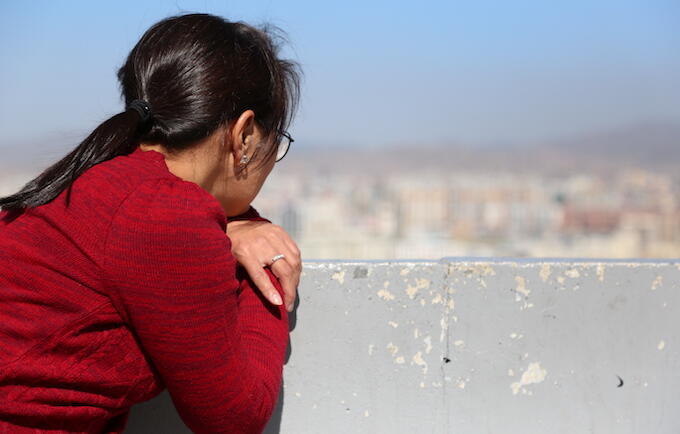Darkhan-Uul, Mongolia – When Dulam* first sought help from a One Stop Service Centre in northern Mongolia, she was suffering from post-traumatic stress disorder.
The 38-year-old mother and her four children had experienced violence by her husband for years.
Dulam hid the violence from family and friends in fear of bringing shame upon her children. She was quickly losing hope that things would ever get better—she even contemplated suicide.
One cold winter night, Dulam’s husband returned home in a state of rage, once again subjecting her to severe emotional and physical violence. Fearing for his mother’s life, her 16-year-old son called the country’s ‘102’ helpline managed by the National Police Agency. It was the first time anyone in Dulam’s household had called the helpline; previously she had been too ashamed to reach out for such assistance.
With the helpline’s guidance, Dulam and her children escaped to the One Stop Service Centre —one of 17 in Mongolia providing comprehensive assistance to women experiencing violence.
The family stayed there for a month, where they participated in extensive therapy and ‘life-skills’ sessions to help them cope with their trauma and gradually build confidence. The children, long disturbed by domestic discord, also received support to continue their studies. And, to enhance her financial independence, Dulam graduated from the One Stop Service Centre’s ‘Empowered Mothers’ programme. This two-part initiative provides an avenue for survivors to share their experiences with one another through facilitated support groups, even as it teaches them marketable skills they can use to earn a living.
Sadly, the majority of women in Mongolia experience some form of violence, and now, during the COVID-19 pandemic, gender-based violence is intensifying as women are confined amid lockdowns with their abusers, usually their spouses or partners.
According to the 2017 National Study on Gender-based Violence conducted by the National Statistics Office and UNFPA, nearly 60 per cent of women in Mongolia have experienced some form of violence—physical, sexual, emotional, economic and/or controlling behaviours—by an intimate partner, most often a husband, in their lifetime. In the year prior to the survey, 35 per cent of women experienced at least one of these forms of violence.
The COVID-19 pandemic and its containment measures have exacerbated existing gender inequalities and contributed a drastic rise in gender-based violence globally, while also jeopardising prevention efforts and the availability of services for survivors.
While Mongolia’s COVID-19 prevention decrees have helped control the virus’ spread, service providers throughout the country have seen significant spikes in reported incidents of gender-based violence during the period when containment measures were most stringent. In the first quarter of 2020, reports of incidents of domestic violence to the National Police Agency increased by nearly 50 per cent compared to the same period in 2019. Even more striking, the average number of clients served by One Stop Service Centres increased by almost 90 per cent, compared to the same period in 2019. The One Stop Service Centre where Dulam and her family received help served close to twice as many clients in March 2020 compared to March 2019.
With her newfound assurance and optimism, Dulam seized opportunities to rebuild her life. Inspired to help other survivors find ways out of violent relationships, she now raises awareness about gender-based violence in her community and works as a nursing assistant in a private hospital with hopes of supporting even more women experiencing these challenges.
“The One Stop Service Centre helped rebuild my life,” Dulam shares. “I smile a lot more now than before. I have faith in my future. I found a ‘new me’ and feel like I have been reborn.”
Stories like Dulam’s are a testament to the essential nature of services for the thousands of women like her who experience violence in Mongolia. During the COVID-19 pandemic and in its aftermath, as well as future humanitarian crises, gender-based violence prevention and support programmes are more important than ever.
In Mongolia, One Stop Service Centers offer survivors of gender-based violence and their families a full range of services, including safe accommodations, health care, psychosocial counseling, protection services, and basic legal guidance. They are led by the Government of Mongolia’s Ministry of Justice and Home Affairs and the Ministry of Labour and Social Protection, with support from UNFPA and the Swiss Agency for Development and Cooperation. In response to the influx of reported incidents of gender-based violence during the COVID-19 pandemic, two new One Stop Service Centers opened in the country’s capital, Ulaanbaatar.
UNFPA, the UN’s sexual and reproductive health agency, works in over 150 countries, including Mongolia. UNFPA seeks to achieve zero maternal deaths, zero unmet need for family planning and zero gender-based violence and harmful practices against women and girls.
For more on our response to the COVID-19 pandemic, visit https://www.unfpa.org/COVID19.
To support our lifesaving work amid the pandemic, visit https://donate.unfpa.org/th-en/covid-19.
* Name has been changed for the survivor’s protection. The survivor provided informed consent for use of her story.


